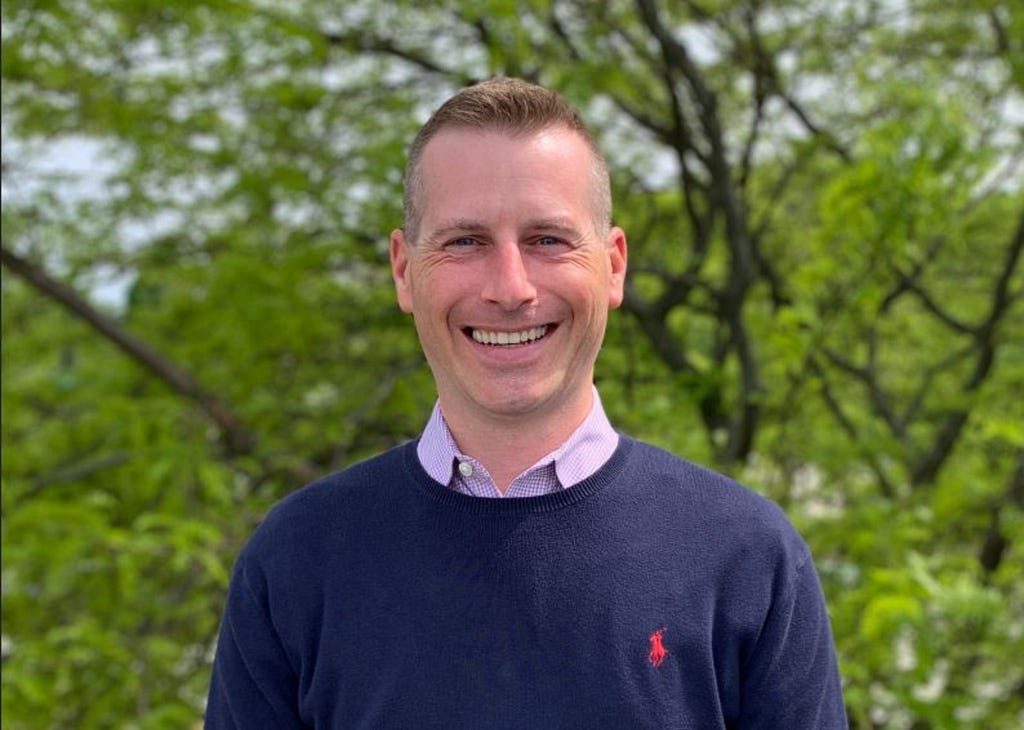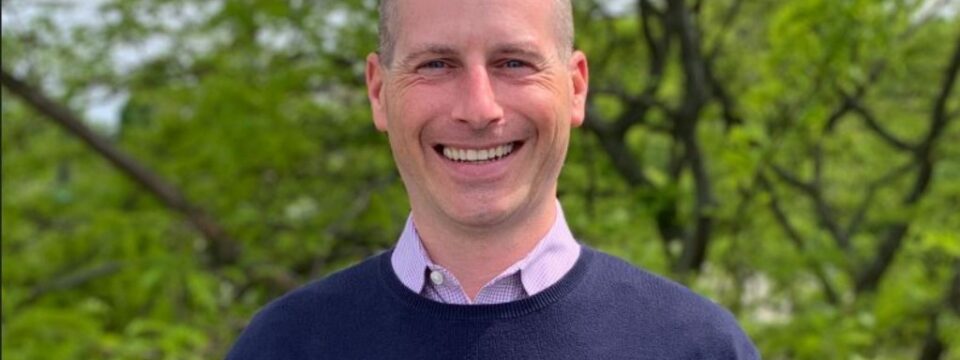
Leadership is modeling. As a leader, I would never expect my team to do something I would be unwilling to do myself. In addition, I work hard to be active in demonstrating the type of quality, commitment and product I would like from my amazing team. I will frequently take the lead on a new initiative or engagement to set the stage for my team. Modeling not only provides expectations on quality, but offers moral, ethical and legal guidance on professionalism and behavior.
As part of my series about “individuals and organizations making an important social impact”, I had the pleasure of interviewing Brandon Combs.
Brandon is a passionate and dedicated nonprofit executive. He has over 20 years of experience in nonprofits ranging from Executive Director, Board Member to volunteering for many passions and causes. He joined Erika’s Lighthouse in June 2019. Brandon completed a Master’s in Nonprofit Administration from North Park University and his BA in Political Science from Indiana. Brandon wants to ensure that every child feels empowered, validated, and important.
Thank you so much for joining us in this interview series! Can you tell us a story about what brought you to this specific career path?
Thank you so much for speaking with me today. It is a privilege.
I knew I would be working in the nonprofit space since I was a child. In middle school, I began volunteering at a local homeless organization doing yard work. It was a small thing — but the way the organization treated, respected, and appreciated my contribution made me feel wonderful. I had the opportunity to meet residents that we’re working to improve their lives and knew I wanted to be a part of that — helping other people improve their lives and appreciate those supporting their work.
Can you share the most interesting story that happened to you since you began leading your company or organization?
Shortly after starting at Erika’s Lighthouse, I joined one of our Teen Empowerment Clubs to complete an awareness-raising activity in their school. This group of passionate teens started by sitting down with a hockey player from the Chicago Wolves and holding a roundtable discussion with him. The stories they shared were personal, emotional, and uplifting. The ability of these young people and young adults to find common ground by sharing their experience with mental health challenges and passion to Get Depression Out of the Dark was inspiring. It was empowering to hear open conversations about mental health, trauma and the impact young people can have on our society if we normalize these discussions.
Can you share a story about the funniest mistake you made when you were first starting? Can you tell us what lesson you learned from that?
Early in my role, we had a couple of volunteers by the same first name. Being new, I did not understand that. Apparently, the rest of the team always knew which volunteer was being discussed based on the context of the situation. But, I didn’t even realize there were two different people. It was finally revealed when I mentioned I was going to reach out to one of the volunteers, using their full name, about a topic. I received a shocked and confused look from one of my team members about why I would ever talk to that person about that. We enjoyed a good laugh that I had gone a few weeks without knowing the difference between different people. It is always important to ask questions and clarify conversations.
Can you describe how you or your organization is making a significant social impact?
At Erika’s Lighthouse, we look at our societal impact and how we can empower children, teens, schools, and the larger community as a whole to stand up, speak out and seek help. Our classroom education is designed to reduce the stigma around mental health, raise awareness for it, promote good mental health and encourage help-seeking. Depression education is suicide prevention and through early identification and intervention of children and teens experiencing mental health issues, we can ensure no one feels alone in their depression. We believe that everyone deserves good mental health, and our goal is for teens to feel empowered to come forward and express that they need help. For schools, we provide wraparound resources to promote inclusive school cultures and open dialogue around mental health to reduce barriers for children and teens seeking help. Societally, we believe young people can change the world. By starting in schools, whole communities will change as we transform the conversation around mental health one generation at a time. Each of these will facilitate more conversation, more help-seeking and more young people getting the support they need.
Can you tell us a story about a particular individual who was impacted or helped by your cause?
One young girl comes immediately to mind. A teen named Allison, a member of one of our Teen Empowerment Clubs has passionately shared how important our Teen Empowerment activities were to her. Allison had a very deep and personal experience with mental illness and suicide. The Teen Empowerment Club in her school gave her a positive outlet to begin having open conversations about it and to positively impact her school. She wanted to ensure no other teen had to experience what she had to and to provide hope for her classmates.
Are there three things the community/society/politicians can do to help you address the root of the problem you are trying to solve?
There are things we can all be doing to address the root of the problem we are working to solve.
- We need to talk about it. The power of dialogue, empathy, and understanding about mental health would help millions every year know they are not alone.
- We need education. Every student in every school in the country needs to be educated about mental health. They need to know how to promote good mental health for themselves, how to ask for help if they need it, and how to empathize with others that may be struggling.
- Schools need resources. Educating and discussing mental health is vitally important. But ensuring children and teens have the resources and support they need if they are experiencing depression or mental health issues is equally important. School counselors, social workers, and strong referral sources for outside-of-school communities will facilitate access to necessary services.
How do you define “Leadership”? Can you explain what you mean or give an example?
Leadership is modeling. As a leader, I would never expect my team to do something I would be unwilling to do myself. In addition, I work hard to be active in demonstrating the type of quality, commitment, and product I would like from my amazing team. I will frequently take the lead on a new initiative or engagement to set the stage for my team. Modeling not only provides expectations on quality but offers moral, ethical, and legal guidance on professionalism and behavior.
What are your “5 things I wish someone told me when I first started” and why. Please share a story or example for each.
I have been very lucky in my career and current role to have amazing mentors and thought partners that have helped me develop my career. While I wish I could condense their wisdom into five points that I could share with others, I’m not sure that is possible. What I will say is that it is important for all of us to keep our eyes and ears open, ready to learn. Everyone around us has something to teach us. Everyone’s journey is different and we can only blaze our trails with confident humility.
You are a person of enormous influence. If you could inspire a movement that would bring the most amount of good to the most amount of people, what would that be? You never know what your idea can trigger. 🙂
I have always been inspired by the idea of large collaboration and impact. In my professional space, I love the idea of crafting a collaboration of nonprofit organizations working in mental health focused on children and teens that serve as a continuum of free resources and services. From social-emotional learning to effective and needed treatment providers and everything in between. How can we work together to offer school communities everything they need as it relates to student mental health to really make a difference?
Personally, the need expands well beyond student mental health. How can all community nonprofits work together to ensure no child or teen is left behind? There are so many amazing frameworks for what children need to thrive in life. How can community organizations and partners better identify, track and support those needs collaboratively?
Can you please give us your favorite “Life Lesson Quote”? Can you share how that was relevant to you in your life?
“This is what you shall do: Love the earth and the sun and animals, despise riches, give alms to everyone that asks, stand up for the stupid and crazy, devote your income and labor to others, hate tyrants, argue not concerning God, have patience and indulgence toward the people, take off your hat to nothing known or unknown to any man or number of men… read these leaves in the open air every season of every year of your life, re-examine all you have been told at school or church or in any book, dismiss whatever insults your own soul, and your very flesh shall be a great poem and have the richest fluency not only in its words but in the silent lines of its lips and face and between the lashes of your eyes and in every motion and joint of your body.” Walt Whitman
I have always held this up as an ideal in my life. I do not always meet it.
Is there a person in the world, or in the US with whom you would like to have a private breakfast or lunch with, and why? He or she might just see this, especially if we tag them. 🙂
I would love to meet Melinda Gates. Her passion and dedication towards youth mental health are amazing. We share a vision that would be amazing to further explore.
How can our readers follow you on social media?
I would love to have everyone follow Erika’s Lighthouse on:
Facebook: https://www.facebook.com/ErikasLH/
Twitter: https://twitter.com/Erikas_LH
LinkedIn: https://www.linkedin.com/company/erika-s-lighthouse/
People can personally find me on Linkedin at: https://www.linkedin.com/in/bmcombs/
Thank you for having me!
This was very meaningful, thank you so much. We wish you only continued success on your great work!
Social Impact Heroes: Why & How Brandon Combs of Erika’s Lighthouse Is Helping To Change Our World was originally published in Authority Magazine on Medium, where people are continuing the conversation by highlighting and responding to this story.
